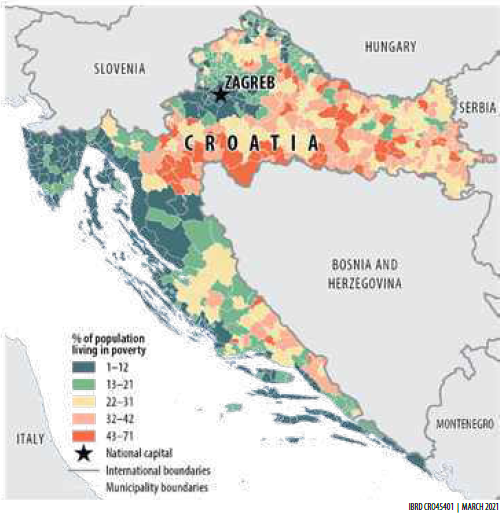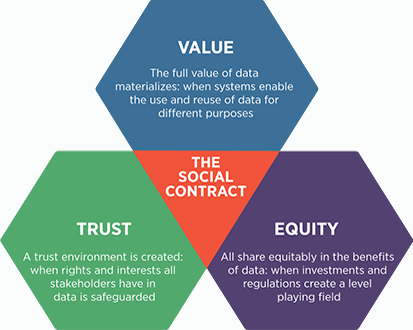Data is a powerful weapon in the fight against poverty—one that can potentially transform the lives of poor people. But it’s also a double-edged sword. New rules of the road are called for—a social contract for data—to get more value out of data while protecting people against harm and ensuring access and representation.
FIGHTING POVERTY WITH DATA
Data has become ubiquitous—with global data flows increasing one thousand times over the last 20 years. What is not always appreciated is the extent to which data offer the potential to improve people's lives, including the poor and those living in lower-income countries.
Consider this example. The Indian state of Odisha is susceptible to devastating cyclones. When disaster struck in 1999, as many as 10,000 people lost their lives. This tragedy prompted the Odisha State Disaster Management Authority to invest heavily in weather forecast data. When another, similarly powerful storm struck in 2013, the capture and broadcast of early warning data allowed nearly one million people to be evacuated to safety, slashing the death toll to just 38.
Data’s direct benefits on lives and livelihoods can come not only from government initiatives, as in Odisha, but also through a plethora of new private business models. Many of us are familiar with on-demand ride-hailing platforms that have revolutionized public transportation in major cities. In Nigeria, the platform business Hello Tractor has adapted the concept of a ride-hailing platform allowing farmers to rent agricultural equipment on demand and increase their agricultural productivity.
Furthermore, Civil Society Organizations across the world are using crowdsourced data collected from citizens as a way of holding governments accountable. For example, the platform ForestWatchers allows people to directly report deforestation of the Amazon. And in Egypt, the HarrassMap tool allows women to report the location of sexual harassment incidents.
TAPPING DATA’S FULL POTENTIAL
Despite all these innovative uses, data still remain grossly under-utilized, leaving much of the economic and social value of data untapped. Collecting and using data for a single purpose without making it available to others for reuse is a waste of resources. By reusing and combining data from both public and private sources, and applying modern analytical techniques, merged data sets can cover more people, more precisely, and more frequently. Leveraging these data synergies can bring real benefits.
In Croatia, data from the population census was combined with household survey data and administrative data to create granular maps of poverty (Figure 1), revealing large differences in living standards across municipalities and also pockets of poverty within better-off regions. Because the allocation of funds from the European Union depends on an area’s per capita income, poor municipalities situated in nonpoor regions were at a disadvantage. Armed with this new poverty map, Croatia was better able to concentrate EU funds in the poorest areas and thus better target resources and help reduce inequality.
Figure 1. Reducing poverty: Mapping pockets of poverty in Croatia allowed better targeting of antipoverty funds

DOUBLE-EDGED SWORD
Yet, the more data are reused, the greater the risk that they will be misused. As data are combined, reused, and repurposed in ever more creative ways, the scope for positive effects increases rapidly. At the same time, so does the potential for data to be misused, often in unanticipated ways.
For example, call detail records (CDR) from mobile phones are created for private sector purposes but have recently been in the news as a tool to allow governments to perform contract tracing for COVID-19. For example, in March 2020, the Israeli government approved emergency regulations that allowed for the use of CDR to track and curtail the spread of the virus. In the early days of the pandemic, the use of CDR in Israel accounted for the identification of an estimated 1/3 of their COVID-19 cases. But, this new use of CDR data to track people sparked debate and pushback over concerns about the potential misuse of the data by the government. In Israel, many lawmakers raised privacy concerns, and the Supreme Court eventually halted the program.
A NEW SOCIAL CONTRACT FOR DATA
This back and forth on the use of CDR data illustrates how nations engage in internal dialogue on the rules of the road for the appropriate use of data. The World Development Report 2021 highlights the pressing need for all countries to establish new social contracts to guide the appropriate use of data. Successful social contracts will be based on rules that help realize the potential value of data, while creating trust in all participants that they will not be harmed and that they will share in the benefits realized from greater use of data (Figure 2). Finding the right balance will differ from country to country, reflecting differences in social norms and values, but all will benefit from advances in technology that protect people while facilitating use.
Figure 2. Developing a new social contract for data based on the pillars of trust, equity, and value

The social contract is brought to life by effective data governance. That means working on policies that will close the digital divide, providing universal broadband access, and ensuring that all countries can access modern infrastructure to exchange, process, and store growing volumes of data. It also entails developing regulatory frameworks and institutions to safeguard data through cybersecurity and data protection measures, while enabling the safe sharing and reuse of data. As of today, barely 40 percent of such good practice data regulations are in place around the world. Data governance also has wider implications for the economy, since data-driven platform businesses are a rapidly growing sector, which is increasingly contributing to international trade and tax mobilization.
TOWARDS AN INTEGRATED NATIONAL DATA SYSTEM
Figure 3. Data flow safely across all stakeholders in an integrated national data system

With a social contract in place and good governance established, facilitating greater reuse and repurposing of data requires better data systems. This Report offers the aspirational vision of an integrated national data system (INDS) to deliver on the promise of producing high-quality data that can be safely shared across all stakeholders—including government, civil society, academics, individuals, and the private sector. While almost all countries are far away from realizing this aspiration, Estonia’s X-Road—which allows public and private databases to automatically exchange information, ensuring confidentiality, integrity, transparency, and interoperability among parties—points to what may become increasingly possible for other countries.
People are at the center of all of this. We all need to better understand the many ways in which data can be used, both to help and harm. A well-functioning system requires people to produce, process, and manage high-quality data and people to draft and implement data strategies, policies, and regulations. A well-functioning system also requires people to use data to hold the public and private sectors accountable. And, people to use data as a factor of production in both the public sector—for policy design and program implementation—and the private sector—for decision-making and innovations in products and services.
All this requires robust data literacy. Recognizing the importance of skills, Nepal has made it a priority to teach people how to work with data. The Nepal Data Literacy Program is a course designed to both support specialized technical skills and enhance a wider culture of data use. The Kathmandu University School of Management is incorporating this data literacy toolkit in its programs.
To download the report, click here.
To learn more about the World Development Report 2021, please visit this website.





Join the Conversation